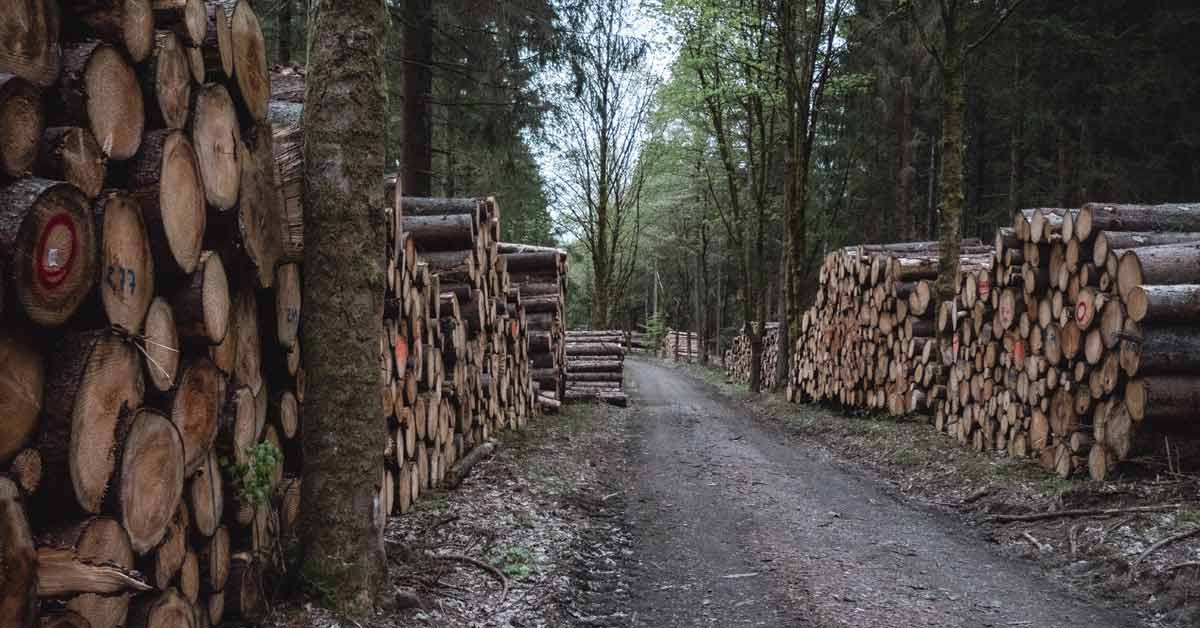3 min read
German Forestry News: Softwood Log Exports Drop 50% in Last 3 Years
ResourceWise
:
Oct 9, 2023 12:00:00 AM

Several important forestry updates out of Germany as the country’s softwood log trade shows substantial changes in recent years. This comes on the heels of multiple climate change-driven impacts on forests and timber yields.
In this post, we’ve compiled a few of the top stories related to the German lumber market.
German Softwood Log Exports Fall by Half in 3 Years, May Become a Log Importer by 2024 if Trends Continue
(Source: Hakan Ekstrom, Director, ResourceWise International Forest Products Sector)
According to Wood Resources International from ResourceWise, export volumes of German softwood logs have been devastated in the last three years.
Export numbers maintained a mostly steady trend for about 20 years. However, they briefly saw an increase in 2020 after COVID-19 demand spiked export demand. Since then, Germany has seen a serious dip in exports.
Multiple factors contributed to this decrease, primarily insect infestation and drier summer conditions. The resonating effects of climate change directly contributed to both of these issues.
Germany historically was a net importer of softwood logs. But that swapped into 2020 as immense demand switched the country to a net exporter. With the large drops now reported, we may see Germany return to net importer status.
Download our Market Insights report from Hakan Ekstrom to get the details on these changes.
United Bankers Forest Industry Green Growth Fund Invests €36.6 Million in Germany-Based Biomaterials Firm Traceless
(Source: Cision News)
The United Bankers Forest Industry Green Growth Fund (UB FIGG), an investment firm focused on replacing fossil fuel use with woody biomass and other renewable products, announced a €36.6 million investment in the German company Traceless.
Traceless processes waste leftovers from agriculture into renewable biomaterials. The company’s bio-based materials are free from plastics and minimize their overall ecological footprint. The materials are also compostable at a consumer level, enhancing their potential for renewability.
UB FIGG is a private equity firm focused on the transition to renewables. They seek out companies like Traceless with products and services aligned with the carbon transition. This includes companies that develop technology and innovation to improve efficiency in harvesting and producing materials such as wood products.
The objective is to aid both the forest products and biomaterials industries as they transition into a non-fossil fuel future.
Related: What wood-based molecules bring to next-generation fuels and chemicals
Climate Change Leading the Charge in Tree Mortality in Germany’s Black Forest
(Source: University of Freiburg Office of University and Science Communications)
Southwest Germany’s Schwarzwald Forest is experiencing a high degree of tree deaths—and climate change is the main culprit.
A lengthy study from the University of Freiburg monitored growing patterns in the Black Forest. Following 68 years of growth data (1953-2020), researchers measured tree mortality across 250 thousand hectares of public forestlands. This data was then compared with the water balance of the climate across the growing season of May to September.
Their findings conclusively showed that trees were dying more often due to the shifts in climate. The changes included longer summers that are dryer and hotter. Water availability, particularly in the crucial growing period, had also decreased.
Perhaps some good news related to the data is that the Black Forest seems to have made it through the worst of the storm. Data shows that mortality peaked in 2019 at seven times more dead trees per annum than the leading years of 1953-2017.
Trees in the Black Forest tend to grow better in periods where cooler, humid weather persists. However, these periods have significantly decreased over the decades from the effects of human-caused climate change.
Amplified by Climate Change, Bark Beetles Are Impacting German Forestlands
(Source: AP News)
In northern Germany, the Harz Forest is also feeling the impact of negative climate change effects. In this case, the main issue is with bark beetles.
Also known as "book printers," eight-toothed beetles are decimating the spruce population. Up to two-thirds of the regional spruce trees are now gone.
Research shows that human-caused climate change is the primary culprit. Bark beetles are an ever-present pest in many forests. But the drier seasons with less rain make the trees even more vulnerable to infestation.
Improved forest management is the key to addressing and slowing the dying tree population. This comes with better insect detection, pesticides and speedy removal of affected trees.
Related: Latvian State of Emergency: Eight-Toothed Spruce Bark Beetle Threatens Forests
News, Insights and Updates When You Need Them
ResourceWise will continue to cover all the critical forest products news and updates out of Germany, Europe and beyond. Learn more about the current trends in the German lumber market by reading our Market Insights report from Hakan Ekstrom, Director of the ResourceWise International Forest Products Sector.




![[Video] Molecules to Markets Episode 1: Chemical Markets Begin 2026 in a Supply-Driven, Margin-Sensitive Environment](https://www.resourcewise.com/hubfs/images-and-graphics/blog/chemicals/2026/weekly-video-series-molecules-to-markets/CHEM-Weekly-Video-Series-Molecules-to-Markets-Episode-1.png)
